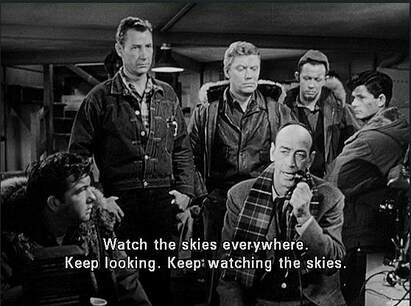 A scene from Howard Hawks' "The Thing from Another World" A scene from Howard Hawks' "The Thing from Another World" David Hoefer, co-editor of The Last Resort, looks skyward for inspiration. If you would like to submit a blog post for Clearing the Fog, contact us here. My favorite science fiction movie is The Thing from Another World, produced (and possibly directed) by Howard Hawks in 1951. Based on a classic John W. Campbell pulp-magazine story, The Thing tells the tale of a group of American scientists and military personnel stationed in the remote Arctic North who fight off a superhuman alien invader with a crash-landed UFO that is likely in the vanguard of worse things to come. The movie ends with the victorious survivors gathered around journalist Ned Scott filing his news report over the radio. Scott admonishes his listeners to be prepared for further trouble; indeed they must remain alert and, he says, “Keep watching the skies!” [photo credit] That phrase has always stuck with me, though without the sense of impending danger that is integral to the movie. No, the reason to keep watching the skies, especially after dark, is the beauty it reveals and the pleasure it brings. Though mostly unmentioned in The Last Resort, I have to imagine that Pud and his pals indulged in some nighttime sky-watching of their own. (There is, for instance, a reference to a beautiful moonlit evening in the entry for May 29, 1942.) As soon-to-be scientist and soldier John Goodlett would have known, nature is not limited to Earth. This same realization came to me during a recent late-night foray in celestial observation. I was outside in pleasantly cool weather, head tilted up and eyes straining, to see the Lyrid meteorite shower, which reached peak viewing in Louisville during the evening of April 22. An hour of intermittent scrutiny netted three sightings, with a possible fourth. Of course, stargazing was made for ancient agriculturalists and mountaintop astronomers rather than dwellers of the inner suburbs. I’ve never forgotten the spectacular night skies over Ghost Ranch from my digging days, when I was looking up in the dark rather than down in the dirt. The fewer the humans, the better the viewing, and north-central New Mexico is a place of relatively few humans. That said, I had some limited success on the 22nd with the aid of high-tech tools: a Web site, Timeanddate.com, which first clued me in that there was a reason to go outdoors, and an iPhone compass, which helped me locate the Lyrid radiant in degrees azimuth. (I had to guess the altitude, using the much-less substantial protractor I carry around in my head.) That wasn’t the only technology that popped up on this occasion. I was surprised by the number of off-planet contraptions—some jets but also quite a few satellites—that were partaking of arcs through the sky. The spangling but austere nights of a world before the Wright Brothers are being replaced by busier tableaux, like a gentle picnic suddenly swarming with fire ants. Meteorites are aptly described as shooting stars. Those I saw appeared in brief flashes, streaking parallel to the horizon rather than moving to intercept it. My iPhone compass may have been useful but not so the camera; the seemingly random appearance of the Lyrids made obtaining a still photograph impossible. I’d have been better off with a time-lapse device, the visual equivalent of a Geiger counter. What images I do have are salted away in memory, but I’ve included these graphic elements from the Internet, as inexhaustible in its way as the infinite skies that surround us.
2 Comments
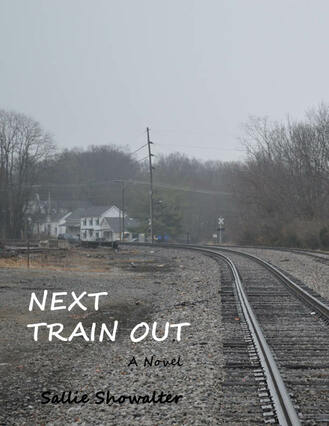 Paris, Ky. Photo by Rick Showalter. Paris, Ky. Photo by Rick Showalter. It’s done. I have completed a novel. Six months ago I wasn’t sure that I could do it. I wasn’t even sure that I wanted to. I had lost confidence. It was requiring too much sacrifice. I had pushed away friends and family. I skipped events and family gatherings so I could work. My aging body was balking at the sedentary lifestyle writing required. I just wasn’t sure I had it in me. And, now, what is surprising me the most is that I am satisfied with the result. After all that time poring over those characters and those settings and those words, I am not tired of it. I am not eager to leave it behind. I find the book compelling. I enjoy reading it. It doesn’t make me cringe. It makes me happy. Oh, sure, I know it won’t be everyone’s cup of tea. But I feel that I have accomplished what I set out to do. I have written a story about my grandfather’s life, as best I could imagine it. I think I have told a good yarn that the reader will want to see through to the end. I have enjoyed crafting sentences that I hope will appeal to those who love words. And I believe I have created two characters who might just stick with you. I expect I’ve made Lyons a little more sympathetic than he actually was, but I had to give the reader a reason to care about him, even if he remains an enigma. The other surprise turned out to be Effie Mae, Lyons’ fourth wife and the other major character in the book. Everyone who has read any portion of the novel seems to love her. In the beginning, I had no intention of assuming her voice and writing from her point of view. She just came to me one beautiful day while I was sitting on my back patio reading a book about writing. But she is now the glue that holds it all together. Getting to know Effie Mae is a reason to read the book. Now, after a few days of breathing deeply, I begin the next phase. I have submitted the book to one independent publisher. I have met with one agent and have another meeting scheduled at the end of May. If none of those options pans out, I will begin the hard work of researching agents and trying to persuade one that my book will appeal to readers. Of course, I have an ace in the hole. I happen to run a little outfit called Murky Press that I know will be interested in publishing this novel. In fact, the sages at Murky Press seemed to portend the challenges, and the joys, of writing it: “We at Murky Press believe peering into our past may help untangle the present. Trouble is, the past can be mysterious. It can be, well, murky. It takes some effort and some patience to interpret what the past is trying to tell us. And we may still get it all wrong.” Perhaps it’s my good fortune that with fiction there is no right or wrong. It’s all make-believe—even when it relays the truth. So if I am able to transport the reader to a different place and time, and to inspire some empathy for people whose lives may be unlike ours, then I’m going to kick back and celebrate a job well done. 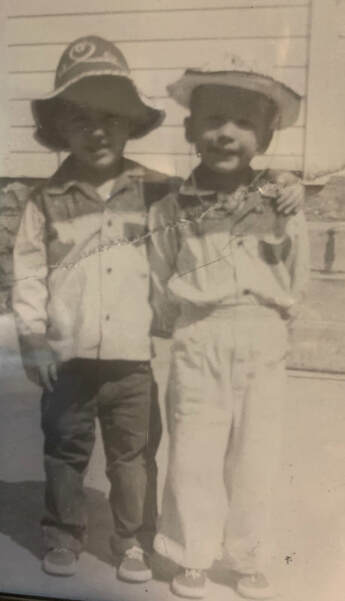 Part of my Minnesota family: Kip Massett and Tim Cooper, cousins and perennial troublemakers, c1960. Part of my Minnesota family: Kip Massett and Tim Cooper, cousins and perennial troublemakers, c1960. Last week Joe Ford in his piece Big Fierce Animals mentioned how publishing The Last Resort and maintaining this blog have helped me reconnect with my extended family and with the families of the boys who visited the Salt River camp. The project also allowed me to reach out to my father’s former colleagues and students and their families. I have written numerous times about these happy consequences. (Branching Out is one example.) This theme may be wearing thin for some of you, but I want to revisit it one more time. As an acknowledged introvert and occasional misanthrope, I can’t overstate the joy I have derived from the communications, the conversations, and the interactions that have occurred only because David Hoefer and I were able to put this peculiar little book into the hands of an unusual amalgamation of people. So if you’ll indulge me, I want to share one more story about a truly serendipitous outcome of this project. A little over a year ago, someone I had known in my youth posted a comment on the blog entry For the Love of Books. That precipitated a robust friendship that has evolved into a mentoring relationship as I worked closely with him to finish the novel about my maternal grandfather. I have made several trips to his home in Minnesota to pore over the writing I was doing. During those trips, I also developed a close relationship with his mother, who is in a nursing home suffering from Parkinson’s related dementia, and with his cousins who assist with her care. Tim and his extended family have become precious to me. Like so many of the other family members and friends I have connected with recently—in some way because of the publication of The Last Resort—they have enriched my life. Last week I was in Minnesota working with Tim to finalize the novel. (OK, perhaps I was also there to attend the NCAA Final Four men’s basketball tournament.) In the midst of an incipient celebration of the book’s completion (since we were unable to celebrate the University of Kentucky’s appearance in the Final Four), we learned that Tim’s uncle—one of Tim’s mother’s most devoted visitors—had suffered a serious medical incident. We rushed to the hospital in a town about 45 minutes away and spent the next three days trying to help his immediate family through an emotionally wrenching crisis.  Tim's beloved Uncle Gene Massett, a Red Wing, Minn., character. Tim's beloved Uncle Gene Massett, a Red Wing, Minn., character. Tim’s uncle died without gaining consciousness. Throughout those three days, the most I could do was take care of two large dogs (so much like my Lucy) while the family members were preoccupied with the emergency. Nonetheless, the family folded me into its midst, allowing me to offer whatever sympathy and assistance I could. I was grateful to help in any small way. But I was overwhelmed by the love they were able to extend to me in the midst of their suffering. My new extended family—my Minnesota family—has already given me more than I can put into words. I cherish their friendship. I wish them peace as they navigate the difficult days ahead. And I am reminded, again, of the unexpected benefits I have reaped from sharing my dad’s journal with readers near and far. 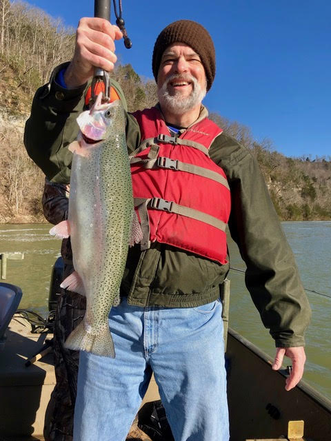 David Hoefer, co-editor of The Last Resort, with a mighty fine trout taken from the tail water of Wolf Creek Dam. David Hoefer, co-editor of The Last Resort, with a mighty fine trout taken from the tail water of Wolf Creek Dam. Joe Ford of Louisville, Ky., is a longtime friend of David Hoefer and Sallie Goodlett Showalter, co-editors of The Last Resort. If you would like to submit a blog post for Clearing the Fog, contact us here. Recently, David Hoefer and another mutual friend, David Summerfield, invited me to join them on a fishing trip to the Cumberland River in South Central Kentucky. This has become an annual pilgrimage for the two Davids, a chance to haul in very large trout in the turbulent waters just below Wolf Creek Dam. Reminded that the window of opportunity would soon open for the Pud Goodlett Memorial Fishing Tourney we proposed last summer, I took to scanning The Last Resort for all things fishing: species, methods, tackle, places. I am constantly amazed at the detail Sallie and David brought to the book and to this blog, from fishing tackle to taxonomy to the political history of Salt River, not to mention Sallie’s amazing grasp of the connections between her own far-flung relatives and the other boys of The Last Resort. As I browsed the Bibliography included in The Last Resort for fishing-related information, I ran across this entry: Why Big Fierce Animals Are Rare: An Ecologist’s Perspective, by Paul Colinvaugh. It turns out that this is a fairly well-regarded collection of essays, as much for its accessibility for non-specialists as for its scholarly worthiness. In essence, it is about ecological niches. But, for me, the content is not the attraction. It's the title: Why Big Fierce Animals Are Rare. I instantly added it to my mental collection of great titles, names, and places. In case you’re wondering, this collection also includes things like the most boring book ever, spied in the window of Blackwell’s bookshop in Oxford, England: A History of Foreign Language Dictionaries. Then again, you probably weren’t really wondering. The attraction of Colinvaugh’s title is actually imagining its opposite: What if big fierce animals were not rare? Isn’t that fun? You have to admit that crows, turtles, and squirrels were not exactly safe around the boys’ camp. So let’s start with fierce (cue Randall’s honey badger vid). What if those crows had been of the sub-species corvus beakus horriblus, like the crows in Hitchcock’s The Birds? Envision the boys huddled in the cabin as the birds swarmed and cawed and screeched and pierced the wood with their large beaks. Don’t laugh. If it could happen in Bodega Bay, it could happen in Lawrenceburg. Or the turtles, terrapin humongosoid. Imagine an entry in the journal about how JCG and Jody had to rescue Bobby Cole after a humongous turtle had latched on and was trying to pull him under. You want big and fierce? What about the squirrels, squirrelsaurus rex? Big as a kangaroo, they might subsist on deer, stray dogs, and, well, go for it, Joe: terrapin humongosoids. Massive enough to shake the ground when they walked, these predators would chase the boys back to the cabin—JCG, Bobby, and Jody dropping fish offerings as they ran and then hiding inside the cabin's sturdy walls until the danger had passed. 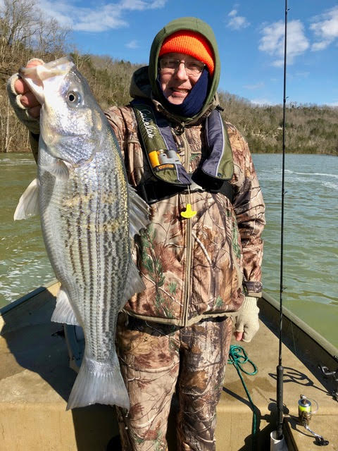 David Summerfield, expedition leader, shows off a Striper (no, not a predatarus toothus). David Summerfield, expedition leader, shows off a Striper (no, not a predatarus toothus). Finally, let’s not forget the fish and predatarus toothus. I’m not suggesting that piranhas are actually in Salt River, though it is a fresh water species native to our hemisphere. I feel I would be remiss, however, not to point out that pythons have taken over the Everglades. I’m sure Salt River has plenty of smallmouth and blue gill for the Davids, and I’m happy to compete in the tourney for bragging rights. But I will say this: You go in first. April 14, 2019 Joe Ford responds to Barbara Fallis' comment (see below). Barbara, you are very perceptive to grasp our fishing prowess so quickly. As a matter of fact, we did catch fish so big they would not fit in a photo. But obviously that meant we could not publish a photo of it. Here is a pic of a slightly smaller fish but still so big that only his eye fit in the picture! Next time we’ll take a bigger camera. I was going to mention this in the blog article, but I thought people would just think I was being absurd.
|
Details
Archives
June 2023
Categories
All
|

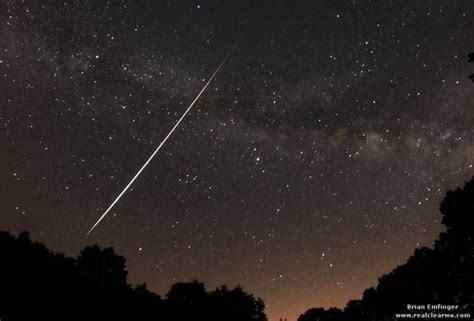
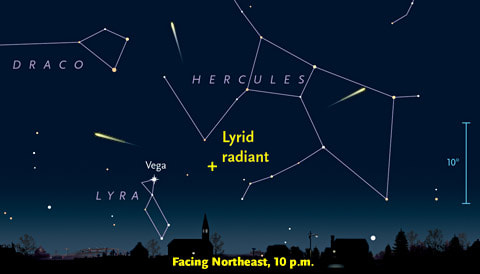

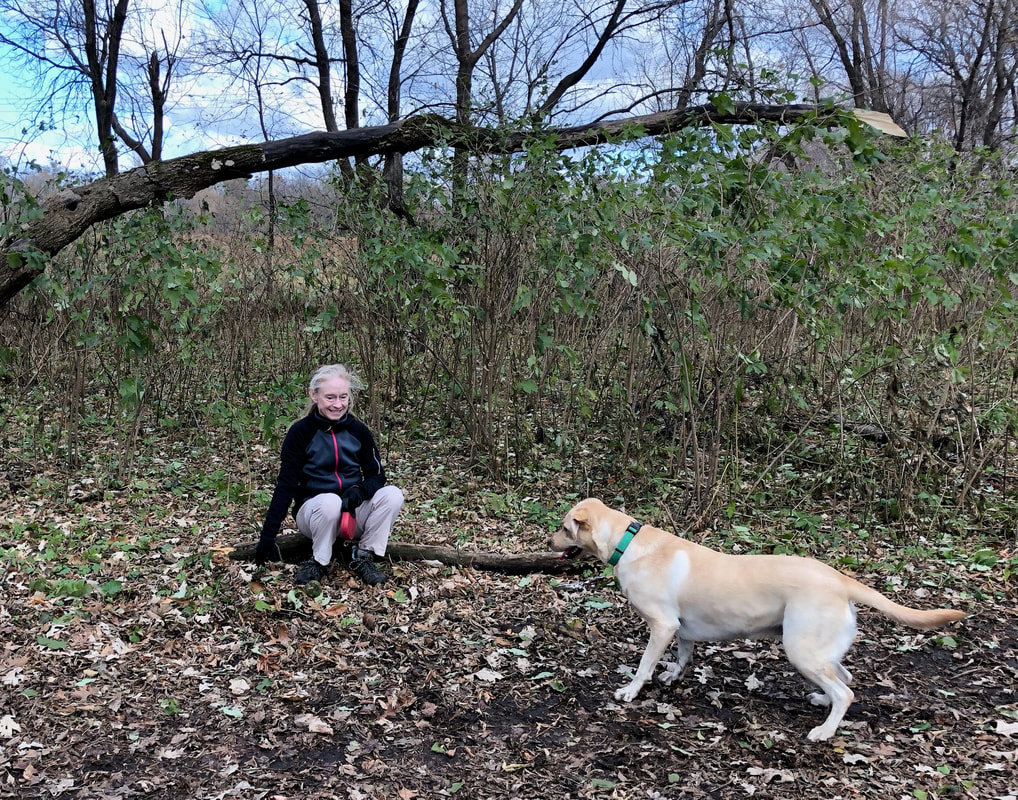
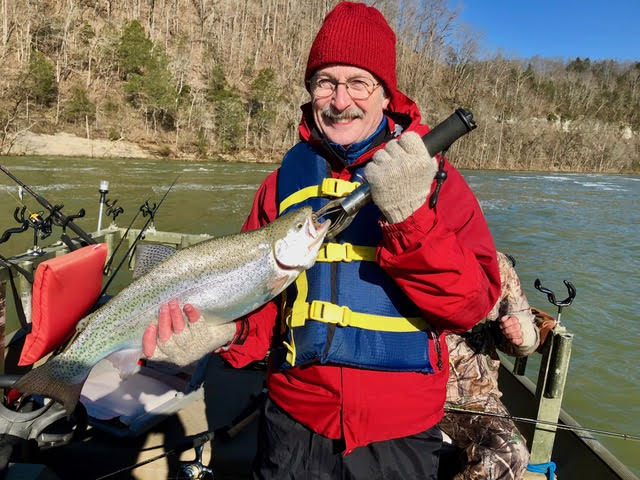
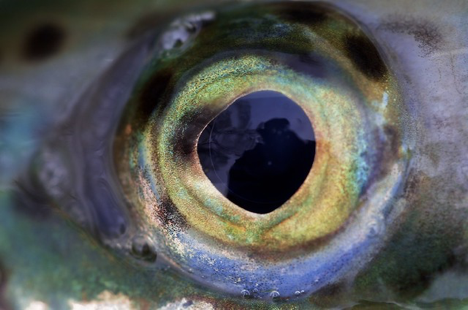

 RSS Feed
RSS Feed